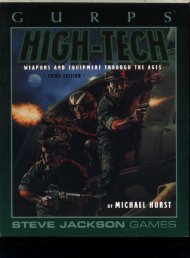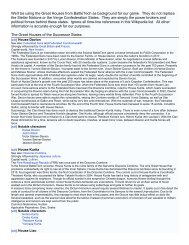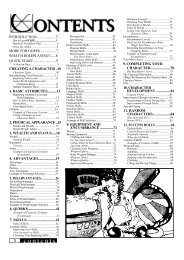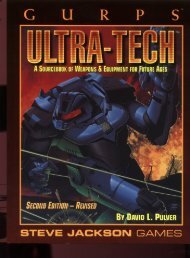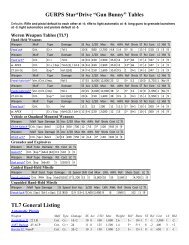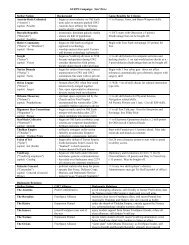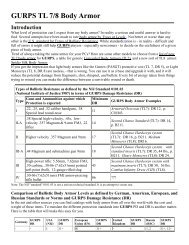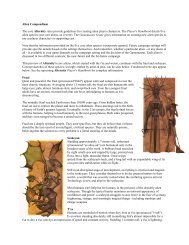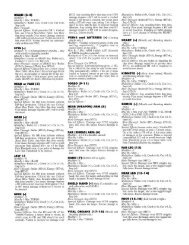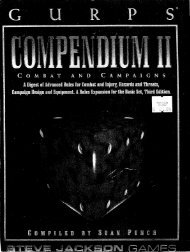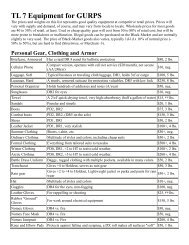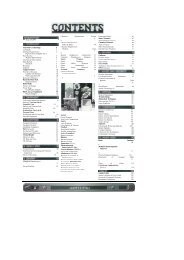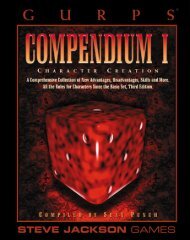Create successful ePaper yourself
Turn your PDF publications into a flip-book with our unique Google optimized e-Paper software.
<strong>Magic</strong> in the<br />
Basic Combat System<br />
These rules give very precise descriptions of<br />
range and area-of-affect, on the assumption that<br />
most campaigns will use some or all of the<br />
advanced combat rules.<br />
But if you are playing without a map, use<br />
these guidelines for “range modifiers” to skill:<br />
Missile spells are always thrown at the<br />
caster’s basic Spell Throwing skill or the DX-3<br />
default. Other combat-type spells are cast at<br />
basic skill if the GM rules the subject is in<br />
“striking range” of the caster. Otherwise,<br />
subtract 3 from the caster’s effective skill.<br />
For other spells: On the rare occasion when a<br />
“mapless” GM needs a precise range or<br />
distance, use those given. Otherwise, just make<br />
it fun!<br />
Special Combat Rules:<br />
Invisibility and<br />
Darkness<br />
In a combat situation where some fighters<br />
can’t see their foes, there will be certain effects<br />
on attack and defense abilities:<br />
Attacker cannot see anything: Attacker must<br />
make a Hearing-2 roll (or use some other<br />
method) to discover his foe’s location. If the<br />
Hearing roll is failed, he may swing at a<br />
randomly chosen hex. His attack roll will be at<br />
-10 (-6 if he is accustomed to being blind), and<br />
cannot be aimed at any particular body part.<br />
Attacker cannot see his foe, but can see his<br />
other surroundings: As above, except the attack<br />
penalty is only -6.<br />
Attacker cannot see his foe, but knows his<br />
location for sure (e.g., defender is in a lone<br />
Darkness hex): As above, but no Hearing roll is<br />
required and the attack penalty is only -4.<br />
Defender cannot see attacker: If the defender<br />
is aware he is being attacked and makes a<br />
Hearing-2 roll, he defends at -4. Otherwise he<br />
gets no active defense at all! If the attacker is in<br />
a hex of Darkness (see p. 58), but the defender<br />
is not, he defends normally since he can see the<br />
weapon coming.<br />
Example: Mordecai is invisible, and fighting<br />
a bandit in daylight. The bandit must make a<br />
Hearing-2 roll to locate Mordecai before each<br />
attack - if he succeeds he attacks at -6.<br />
Mordecai attacks normally and defends<br />
normally. Any defense roll the bandit makes<br />
against an attack by Mordecai is at -4, and if he<br />
misses his Hearing roll he gets no active<br />
defense at all.<br />
Note also that an unseen fighter can safely<br />
try things (stand on a table, lie down, etc.) that<br />
a normal fighter could never do. He may also<br />
just wait in a corner until his foe is exhausted!<br />
The strength of a missile spell depends on the energy put into it. For instance,<br />
a fireball does 1 die of damage for each point of energy used in creating it.<br />
Time to prepare a missile spell depends on the energy put into it; each turn<br />
gives it I point of energy. After completing one turn of concentration, the caster<br />
tries his spell roll at the beginning of his new turn. If he succeeds, the missile has<br />
I point of energy and can be released on that turn; releasing it is a free action, and<br />
the caster can immediately start another spell. Thus, he can cast a 1-point missile<br />
spell every turn.<br />
Or he can hold it and enlarge it! Another second of concentration (no<br />
additional roll required) gives it another point of energy. A third second of<br />
concentration makes it a 3-point missile. This is as big as most missiles can get.<br />
Thus, a wizard could create and release a 1-point missile every turn - or a<br />
2-point missile every other turn - or a 3-point missile every third turn. He may<br />
not aim while he is creating the missile; if he is going to aim, he must take<br />
another turn to do so after the missile is created.<br />
A wizard may keep a missile spell “in hand” after it is ready to throw. He<br />
may move while holding it, or use the Aim maneuver to increase his chances of<br />
hitting. He does not have to release the spell until he wants to. This is the only<br />
sort of spell that can be “held until ready.” A wizard cannot cast another spell<br />
(except a Blocking spell) while holding a missile spell. Blocking spells are at -2<br />
while a missile is in hand, and a critical failure on the Blocking spell causes the<br />
missile to go off prematurely and affect its creator...<br />
If a wizard is injured while he has a missile “in hand,” he must roll vs. Will.<br />
If he fails the roll, he loses control of the missile. A solid missile will simply fall<br />
to the floor, but fireballs, lightning and curses will immediately affect the<br />
unlucky caster!<br />
Blocking Spells<br />
A “blocking” spell is a spell that can be cast instantly as a defense - either<br />
against a physical attack or against another spell. This is the magical equivalent<br />
of a block, parry, or dodge. You may only use one blocking spell each turn. A<br />
critical success on an attack makes a blocking spell impossible.<br />
If you try a Blocking spell, it automatically interrupts your own<br />
concentration. Any spell you were preparing is lost. However, you may<br />
concentrate again when your own turn comes. And if you have an<br />
already-prepared missile spell in hand, it is unaffected. You cannot cast or<br />
enlarge it that turn, but you may retain it for later use.<br />
PRINCIPLES OF MAGIC<br />
- 12 -



